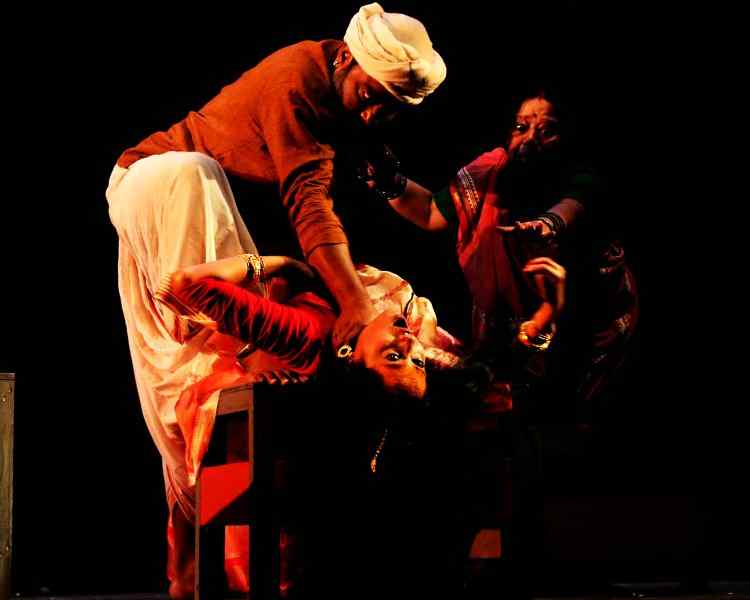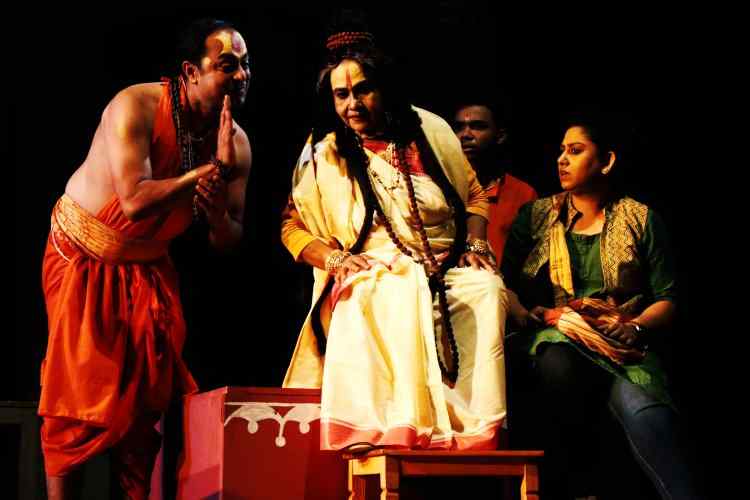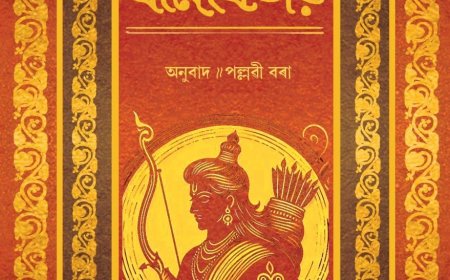Play Review: RANG-ROOP’S NEW PRODUCTION SVAHA MESMERISING

Noted Indian author, Dr. Shoma A. Chatterji reviews Rang-Roop’s recent production Svaha. ‘A play that shocks, mesmerizes and astounds, all at once, writes Dr. Shoma A. Chatterji.
Svaha is a religious chant every Hindu believes in. But is it only a chant? Or is it symbolized through a powerful woman whose matted hair has trapped her in a holy identity which makes her, a woman herself, into “svaha”, also referred to as Manyanti, the Hindu goddess of sacrifices featured in the Vedas. She is the consort of Agni, and the daughter of either Daksha or Brihaspati, depending on the literary tradition.
According to the Brahmavaivarta Purana, she is an aspect of Prakriti (nature), an element without which Agni cannot sustain. Svāhā is chanted to offer oblation to the gods. As a feminine noun, svāhā in the Rigveda may also mean oblation (to Agni or Indra). Svaha is also considered to mean an auspicious ending.
Rang-Roop’s recent production Svaha, is drawn from these threads of Hindu theological and mythological texts and then placed in a contemporary situation to raise questions about how beliefs are used as clever strategies of exploitation and manipulation. The storyline is by Sayantani Putatunda.
The main sign that distinguishes this “goddess” who resides on earth among the common masses, mainly among the unlettered, the superstitious and the ignorant is contained in her matted hair said to be a natural growth which marks her out as the chosen one. But she is a human being and not a Goddess. She has been bestowed the title of Jatadhari Kamini Maa the local villagers and small town residents worship as they believe her not only to be a Goddess but also possessed of magical powers.
When the play opens, one discovers that Jatadhari Kamini Maa, now in middle age, is waiting for a successor to her throne but at the same time, is afraid of greedy parents sacrificing their kid daughter to replace the present Jatadhari Kamini Maa by faking the matted hair. She wants to be liberated from her burden of being Jatadhari Maa as she finds it a constriction on her freedom, she cannot marry, she cannot have children and she even has doubts about her magical powers. She knows her successor will come, but it should not be in the form of a sacrifice of a young girl, not a natural successor. In the initial stages of the play, one has the impression that Jatadharini Kamini Maa is the perpetrator of the practice, uses and misuses her power over the people and holds on to her power. But as the play rolls on, we discover that she is a tragic victim of violence inflicted on her when she was not aware and by the time she realizes her position, it is too late to lead life like a normal woman.

The greed among parents who seek to place their nubile girl in Jatadhari Maa’s place because the title she is bestowed with gives her immense power, wealth and respect is intense. As parents, they seek to gain these through her, not bothered about the consequences that will be borne by a girl who should go to school, play with friends and be mischievous like normal girls her age.
Director Sima Mukhopadhyay with her long track record in Bengali theatre who has enacted the role of Jatadharini Kamini Maa and has also directed this play, has chosen a very challenging and controversial subject which attacks the patriarchal system rooted in blind faith and religious beliefs, and also throws up strong suggestions of a feminist angle. It is a very difficult play not only to stage and present but also to compose, orchestrate and perform with superstitious beliefs that sustain oblivious to the fast-changing scientific world we live in.
Sima Mukhopadhyay holds the audience completely in her grip with her magnificent performance, her body language, her walk and even the changing tone and volume of her voice that change from one mood to the next, present as she is, almost right through the play, dressed like a Goddess Incarnate, bejeweled, her matted plaits trailing behind her, holding herself with unquestioned dignity, though she is beginning to find too heavy a responsibility to bear.
The play presents the social exploiters trying to do their own bit of axe-grinding to line their hidden pockets, complete in their transparent disguises – the priest, the astrologer, the local politician and a poor couple who are trying to groom their little daughter, Jalpa as the successor to Jatadhari Kamini Maa. Jalpa does not understand the implications but she does not like being taken out of school, not permitted to play and have fun like other girls her age, but her matted hair marks her out as the successor to Maa’s throne. Kamini Maa learns through her wisdom that Jalpa’s matted hair is not natural and is made up with the help of glue when she was asleep and she does not wish to place Jalpa in the trap she is captive in.
Bhoomi is a city-bred researcher who has come to the village to do research on this religious practice egged on by blind belief without any basis in science or logic. She begins to question the rationality and the inhumanity of this practice. She is the voice of reason in the play.
Rohini, considered the successor to Jatadharaini Kamini Maa fails to live upto the role and dies, rather, killed by the henchman of the temple. Then Jalpa steps in, the daughter of Kamini Maa’s alcoholic man servant and his wife. Jatadharini, frustrated with the responsibility she has been thrust with, is reluctant to induct Jalpa as the successor as she has gone through the inhumanly cruel life herself. She knows that Jalpa’s matted hair is not natural at all. Not only does she have to remain single, she must also sleep on the floor, have very sparse meals during the day and fruits at night as Maa. Her family members enjoy financial benefits and freebies. Jatadhari Maa is the most powerful person in the area and people come to her to pay their religious obeisance, worship the ground she walks on, but her personal life is devoid of all enjoyment and full of restrictions. Why?

The stage is set up as a single-set play (Sandeep Suman Bhattacharya) where the situation changes according to the demands of the script and when Rohini dies, it comes like a terrible shock, so realistic is the staging and the performance. Arko and Anubhab Mukherjee’s music is both imaginative and aesthetic. Poulomi Talukdar is quite convincing as Bhoomi, shocked that what she is experiencing reaches far beyond her research. Badal Das’s lighting invests the entire performance with the intrigue of magic, reality and exploitation. Different shades of red have been used in the lighting, the set design and in the costumes worn mainly by the female characters while little Jalpa is just the innocent little girl who knows her parents are forcing her to do something but has no idea what that “something” is. She is so natural that one does not feel she is acting out a role.
“Extreme greed for political and economic supremacy is the driving force for spreading the religious divide among the masses. Fear and superstition are used as equally effective tools. Families do not spare their own children if they choose to cross the boundaries set by religion. Despite scientific progress, we remain engaged in superstition, black magic and love jihad,” Sima Mukhopadhyay sums up. The chant Svaha is rendered hollow and futile in an ambience that exploits girls and women holding them captive forever in an invisible web of deceit.
A play that shocks, mesmerizes and astounds, all at once.
***
What's Your Reaction?

































































